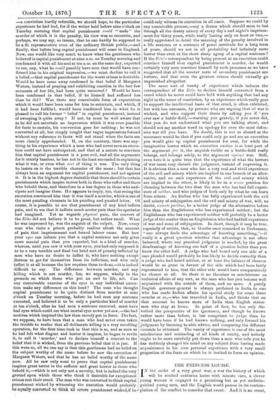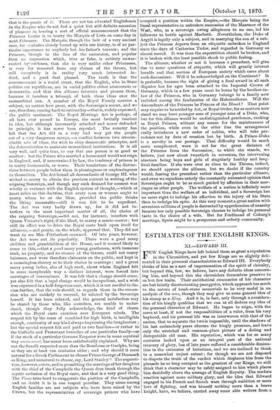behold it,—which is not only not a novelty, but is
indeed the very IN the midst of a very great war, a war the history of which ground upon which those who think it desirable for exceptional 1 will be studied centuries hence with minute care, a clever
that is the puzzle of it. There are not ten educated Englishmen in the Empire who do not feel a quiet but still definite sensation of pleasure in hearing a sort of official announcement that the Princess Louise is to marry the Marquis of Lorn on some day in next February. The Marquis, though the heir of a very ancient race, for centuries closely bound up with our history, is of no par- ticular importance to anybody but his father's tenants ; and the Princess, though in the line of the succession, and popular from an impression which, true or false, is entirely unwar-
ranted by evidence, that she is very unlike other Princesses,
is very far removed from any chance of the throne, but still everybody is in reality very much interested in- deed, and a good deal pleased. The truth is that the announcement is a social event, that the English, who in State politics are republican, are in social politics either aristocratic or democratic, and that this alliance interests and pleases them, because it involves a triumph of both those ideas over the monarchical one. A member of the Royal Family marries a subject, no matter how great, with the Sovereign's assent, and we are, therefore, coming back to rationality—that is, rudely expressed, the public sentiment. The Royal Marriage Act is perhaps, of all laws ever passed in Europe, the most brutally insolent in idea, but although incessantly attacked and never defended in principle, it has never been repealed. The country has felt that the Act did in a very bad way get the people out of a very dangerous scrape,—a conflict between two irrecon- cilable sets of ideas, the wish to obey democratic principles, and the determination to maintain monarchical institutions. It is all very well, and quite true, to say that one person is as good as another ; but the Prince who married a housemaid would not reign in England, and, if unrestrained by law, the tendency of princes is to marry housemaids, or worse. Their touchstone of the distinc- tions between people below them is pleasingness or unpleasingness to themselves. The Act bound all descendants of George III. who wished to marry to obtain the previous consent in writing of the reigning Sovereign, and though any such demand for consent was wholly at variance with the English system of thought,—which at heart relies on this doctrine, that every man or woman ought to marry whom he or she likes, provided the public thinks the liking reasonable—still it was felt to be expedient. The Act was very badly drawn up, for it did not in- terfere in the most important matter of all, the choice of the reigning Sovereign,—did not, for instance, interfere with Queen Victoria's right, if she liked, to marry a music-master ; but still its effect was to drive the Royal caste back upon itself for alliances,—and people, on the whole, approved that. They did not want to see Mrs. Fitzherbert crowned. Of late years, however, the Act wore out its popularity. There were a good many children and grandchildren of the House, and it seemed likely to come to this, —that a good many young gentlemen, with immense rank, no property, and no chance of the throne, could not marry heiresses, and were therefore claimants on the public, and kept in a meaningless slavery as to their choice in marriage ; and a great many young ladies, also of high rank, about whom England felt in some inexplicable way a distinct interest, were forced into marriages of convenience. It was felt that a change should come, yet also felt that a legal change would be inexpedient, and a wish was expressed in a half-forgotten case, which it is not needful to dis- cuss further, that the rule should, as regards those in the succes- sion who are unlikely to succeed, be relaxed by the Sovereign herself. It his been relaxed, and the general satisfaction may be shared by those who, like ourselves, are unable to under- stand, though they fully acknowledge, the kind of charm which the Royal caste exercises over European minds. The respect felt by the mass of mankind for high birth, is intelligible enough, continuity of any kind always impressing the imagination ; but the special respect felt and paid to two families—or rather to the Catholic and Protestant branches of one particular family—as if the stock of a particular German Emperor were in some mystical way sacro-sanct, has never been satisfactorily explained. Why are not the Savelli respected more than the Bourbons or Guelphs, being as they are at least ten centuries older ; and why should it seem natural for a Greek Parliament to choose Prince George of Denmark as King, and unnatural to choose, say, Lord Stanley ? The supersti- tion, however, exists, and in permitting the marriage of her daughter with the chief of the Campbells the Queen does break through the mystic seclusion of the Royal caste, and that is a very good thing. The Times tries hard to exaggerate the position of the Campbells, and no doubt it is in one respect peculiar. They alone among English families are not subjects who have been raised by the Crown, but the representatives of sovereign princes who have accepted a position within the Empire,—the Marquis being the lineal representative in unbroken succession of the Maarmor of the West, who, as a sovereign owing allegiance to no one, led his followers to battle against Macbeth. Nevertheless, the Duke of Argyll is legally only a subject, and in marrying the son of a sub- ject the Princess departs from an etiquette unbroken in England since the days of Catherine Tudor, and regarded in Germany as almost sacred. It was time the superstition should be broken, and it is broken with the least possible shock to public feeling.
The alliance, whether or not it becomes a precedent, will give rise to some questions of etiquette, which will greatly interest heralds and that section of European society which cares about such discussions. Will it be acknowledged on the Continent? It is probable, because the right of giving a final award in all such disputes has for ages been attached to the Imperial Crown of Germany, which in a few years must be borne by the brother-in- law of the Princess, who in Germany belongs to a family now included among the feudatories of the Hohenzollerns. Will the descendants of the Princess be Princes of the Blood ? That point may require to be settled by Act, or Royal Order, for as matters now stand we may have younger sons of younger sons of a Duke, who, but for this alliance would be undistinguished gentlemen, ranking as Royal Princes, without any means for the maintenance of the position, while even in the elder line the arrangement really introduces a new order of nobles, who will take pre- cedence not by date of creation but by birth. A Prince-Duke is a novelty in our peerage. That difficulty would be much more complicated, were it not for the great distance of the Princess from the Succession, to whith she stands, we believe, just now about twentieth in reversion, the intervening nineteen being boys and girls of singularly healthy and long- lived families. If she were ever so close to the Throne, indeed, we should approve the affiance, but we doubt if the country would, fearing the precedent rather than the particular alliance, and even we repudiate utterly the constantly reiterated opinion that Sovereigns ought to be as much guided by affection in their mar- riages as other people. The welfare of a nation is infinitely more important than the welfare of an individual, and a Sovereign has no more right to indulge his affection to the injury of his State than to indulge his spite. At this very moment a great nation with seventeen millions of people is distracted by apprehension of anarchy because her only possible Sovereign chooses to indulge his personal taste in the choice of a wife. But for Ferdinand of Coburg's marriage, Spain might be a prosperous and orderly community.































 Previous page
Previous page